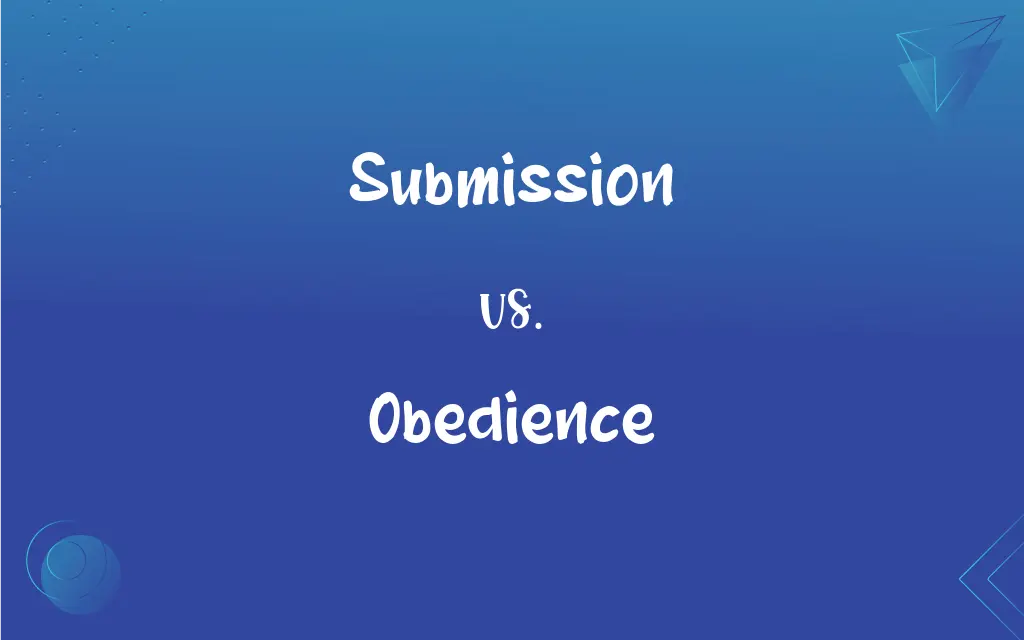Submission vs. Obedience: What's the Difference?
By Harlon Moss & Janet White || Published on March 16, 2024
Submission involves yielding to authority out of respect or deference, while obedience focuses on following orders or rules.

Key Differences
Submission is a broader concept that entails accepting or yielding to the authority or will of another. It often comes from a place of respect, love, or reverence, and can be voluntary, involving a degree of personal choice or decision. In contrast, obedience is the act of following orders, commands, or instructions from an authority figure. Obedience is more about compliance with specific directives or rules and less about the personal relationship between the individual and the authority figure.
The motivation behind submission and obedience can differ significantly. Submission may be driven by trust, admiration, or the desire for harmony within a relationship or group. It implies a willingness to place another's preferences, needs, or decisions above one's own. On the other hand, obedience often stems from a sense of duty, fear of punishment, or the recognition of a hierarchical structure where certain individuals have the right to command.
In terms of power dynamics, submission can be seen as a more complex interaction. It does not merely involve acquiescing to power but can also be a powerful act of trust, indicating strength and control over one’s choices and actions. Conversely, obedience typically reflects a clearer power dynamic, where one party has explicit authority over another, and compliance is expected, if not demanded.
The context in which submission and obedience are applied can vary widely. Submission can be found in personal relationships, religious practices, and certain workplace or organizational cultures where deference to leadership is valued. Obedience, however, is often associated with more structured environments like the military, schools, or any setting where following specific rules and orders is critical to the functioning of the organization.
While both submission and obedience involve a form of power exchange and can sometimes overlap, they are distinct in their essence and execution. Submission is more about the voluntary yielding of control or authority out of respect or affection, while obedience is about adhering to specific commands or standards, often without regard to personal feelings about the authority figure.
ADVERTISEMENT
Comparison Chart
Basis
Voluntary, often based on respect or affection.
Compliance with orders or rules, often due to authority.
Motivation
Trust, respect, love.
Duty, fear of punishment, recognition of authority.
Power Dynamics
Complex, involves trust and choice.
Clear hierarchy, authority has control.
Context
Personal relationships, religious practices, some workplaces.
Structured environments like military, schools, strict workplaces.
Essence
Yielding control or authority voluntarily.
Following specific commands or standards.
ADVERTISEMENT
Submission and Obedience Definitions
Submission
Choosing to yield to another’s authority out of love, respect, or trust, without coercion.
In many religious practices, followers voluntarily submit to the teachings and guidance of their spiritual leaders.
Obedience
Obedience enforced by laws, rules, or authority, often involving penalties for non-compliance.
Citizens show compulsory obedience to traffic laws to avoid fines or other penalties.
Submission
A deep, often affectionate willingness to place another's needs or desires above one's own.
In a partnership, one may submit to their partner’s decision on where to dine, prioritizing the partner’s happiness.
Obedience
Adherence to a set of rules or commands designed to maintain order and discipline.
Students show disciplinary obedience by adhering to school rules and regulations.
Submission
Agreeing with or yielding to another's ideas, knowledge, or expertise.
A student submits to a teacher’s correction on an academic paper, recognizing the teacher’s expertise.
Obedience
Compliance with certain conditions or expectations set by an authority.
Employees adhere to a dress code at work, showing conditional obedience to workplace standards.
Submission
The act of yielding or deferring to the authority, judgment, or opinion of another.
In a debate, one might submit to the superior argument of an opponent out of respect for their insight.
Obedience
Following orders without debate or hesitation, typically in hierarchical or structured settings.
In emergency situations, firefighters’ unquestioning obedience to their commander can be crucial for safety and effectiveness.
Submission
Adhering to social norms or hierarchies by showing deference or compliance.
In a corporate setting, employees may show submission to company leadership through respect and adherence to company culture.
Obedience
The act of following orders or instructions from an authority figure or entity.
Soldiers demonstrate obedience by following their superior's commands without question.
Submission
The act or fact of submitting to the power of another
An army laying siege to a town to compel its submission.
A dog bowing its head in submission.
Obedience
The quality or condition of being obedient.
Submission
The act of submitting something for consideration.
Obedience
The act of obeying.
Submission
Something so submitted
Read three fiction manuscripts and several other submissions.
Obedience
A sphere of ecclesiastical authority.
Submission
The act of submitting or yielding; surrender.
Obedience
A group of people under such authority.
Submission
The act of submitting or giving e.g. a completed piece of work.
Any submissions received after Friday will have marks deducted for lateness.
Obedience
The quality of being obedient.
Obedience is essential in any army.
Submission
The thing which has been submitted.
Obedience
The collective body of persons subject to any particular authority.
Submission
A submission hold in wrestling, mixed martial arts, or other combat sports.
Obedience
A written instruction from the superior of an order to those under him.
Submission
A subset or component of a mission.
Obedience
Any official position under an abbot's jurisdiction.
Submission
The act of submitting; the act of yielding to power or authority; surrender of the person and power to the control or government of another; obedience; compliance.
Submission, dauphin! 't is a mere French word;We English warrious wot not what it means.
Obedience
The act of obeying, or the state of being obedient; compliance with that which is required by authority; subjection to rightful restraint or control.
Government must compel the obedience of individuals.
Submission
The state of being submissive; acknowledgement of inferiority or dependence; humble or suppliant behavior; meekness; resignation.
In all submission and humilityYork doth present himself unto your highness.
No duty in religion is more justly required by God . . . than a perfect submission to his will in all things.
Obedience
Words or actions denoting submission to authority; dutifulness.
Submission
Acknowledgement of a fault; confession of error.
Be not as extreme in submissionAs in offense.
Obedience
A following; a body of adherents; as, the Roman Catholic obedience, or the whole body of persons who submit to the authority of the pope.
Submission
An agreement by which parties engage to submit any matter of controversy between them to the decision of arbitrators.
Obedience
The act of obeying; dutiful or submissive behavior with respect to another person
Submission
Something (manuscripts or architectural plans and models or estimates or works of art of all genres etc.) submitted for the judgment of others (as in a competition);
Several of his submissions were rejected by publishers
What was the date of submission of your proposal?
Obedience
The trait of being willing to obey
Submission
The act of submitting; usually surrendering power to another
Obedience
Behavior intended to please your parents;
Their children were never very strong on obedience
He went to law school out of respect for his father's wishes
Submission
The condition of having submitted to control by someone or something else;
The union was brought into submission
His submission to the will of God
FAQs
Can obedience be voluntary?
Yes, obedience can be voluntary, especially when it arises from a personal sense of duty or moral obligation towards an authority or set of rules.
Why is submission considered complex in terms of power dynamics?
Because it involves not just the act of yielding but also the personal choice and trust behind that action, making it a nuanced form of power exchange.
Can someone be submissive without being obedient?
Yes, one can be submissive in attitude and demeanor towards another’s authority without necessarily following every command, especially if submission is based on respect rather than direct orders.
Is obedience always a sign of respect?
Not necessarily; obedience can stem from fear, recognition of authority, or practical necessity rather than respect.
Can submission be empowering?
Yes, choosing to submit can be empowering when it stems from trust, love, or respect, and is part of a healthy, balanced dynamic.
Are there ethical considerations in demanding obedience?
Demanding obedience raises ethical considerations around autonomy, consent, and power dynamics. Ethically, it's important to ensure that demands do not exploit, harm, or unduly control individuals.
Is it possible to have obedience without submission?
Yes, one can obey orders or follow rules without feeling submissive, especially in contexts where obedience is compelled by external factors like laws or regulations.
How do submission and obedience differ in a relationship context?
In relationships, submission often involves a mutual understanding and respect, whereas obedience might be seen as adhering to specific requests or rules set by one partner.
How do submission and obedience impact organizational culture?
They can significantly influence the dynamics within an organization, with submission fostering a culture of respect and trust, while obedience ensures adherence to established protocols and hierarchies.
Can submission and obedience coexist with mutual respect in a hierarchy?
Yes, in healthy hierarchical relationships, submission and obedience can coexist with mutual respect when authority is exercised responsibly and subordinates' dignity and autonomy are valued.
How does culture influence perceptions of submission and obedience?
Cultural norms and values can significantly shape how submission and obedience are viewed, with some cultures placing a higher value on hierarchical respect and compliance.
Can disobedience ever be justified?
Disobedience can be justified when it's a response to unethical, harmful, or unjust demands, serving as a form of protest or assertion of moral principles over blind compliance.
What role does consent play in submission and obedience?
Consent is crucial, especially in submission, where the act is voluntary and based on mutual respect. In obedience, consent is implied by the acceptance of authority or rules.
What is the psychological basis for submission?
Submission can be rooted in various psychological factors, including the desire for approval, fear of conflict, or respect for perceived wisdom and authority, influencing individuals' willingness to yield.
How do individuals balance submission and autonomy?
Balancing submission and autonomy involves recognizing when to yield out of respect or duty and when to assert one's independence, often requiring self-awareness and negotiation within relationships or communities.
How do submission and obedience differ across cultures?
Cultural values and norms significantly impact attitudes towards submission and obedience, with some cultures emphasizing collective harmony and others prioritizing individual autonomy and questioning authority.
Does societal structure affect the level of obedience in a community?
Yes, societal structure, including its norms, laws, and authority figures, greatly influences the level and forms of obedience within a community, shaping behavior through cultural expectations and legal obligations.
How do age and maturity affect submission and obedience?
Age and maturity can significantly affect perspectives on submission and obedience, with experiences and understanding of autonomy, power, and consequences evolving over time.
What role does communication play in submission and obedience?
Effective communication is crucial in clarifying expectations, understanding the reasons behind directives, and ensuring that submission and obedience do not stem from misunderstandings or coercion.
How does the concept of consent redefine submission and obedience in modern contexts?
The concept of consent redefines submission and obedience by emphasizing voluntary participation, informed choice, and mutual respect, challenging traditional notions of hierarchical power.
About Author
Written by
Harlon MossHarlon is a seasoned quality moderator and accomplished content writer for Difference Wiki. An alumnus of the prestigious University of California, he earned his degree in Computer Science. Leveraging his academic background, Harlon brings a meticulous and informed perspective to his work, ensuring content accuracy and excellence.
Co-written by
Janet WhiteJanet White has been an esteemed writer and blogger for Difference Wiki. Holding a Master's degree in Science and Medical Journalism from the prestigious Boston University, she has consistently demonstrated her expertise and passion for her field. When she's not immersed in her work, Janet relishes her time exercising, delving into a good book, and cherishing moments with friends and family.































































